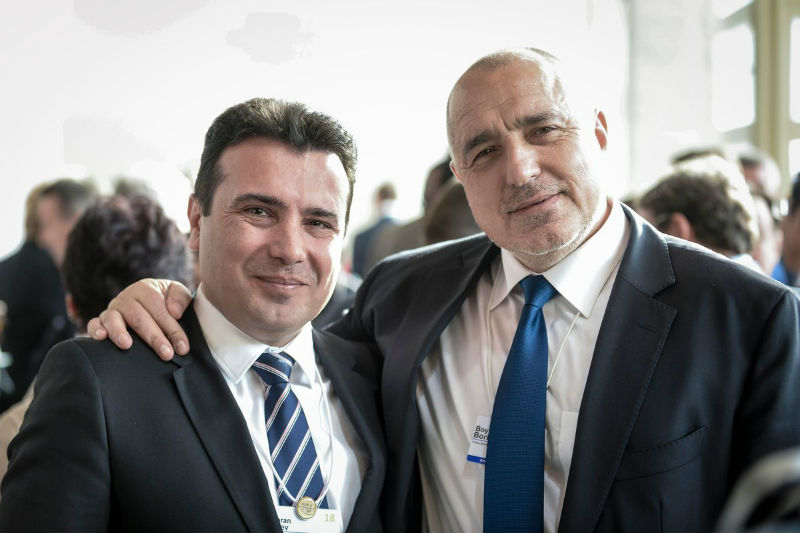Gjorgjiev: Talks with Sofia’s historians will be long and strenuous
The first meeting of the joint multidisciplinary commission of Macedonia and Bulgaria is expected to be held in the third decade of June on the open historical and educational issues between the two countries, after the governments in Skopje and Sofia signed the Treaty of Good Neighborhood. Our and the historians from Bulgaria will thus begin the attempts to get closer to the historical dilemmas from the Middle Ages to the present day.
Prof. Dr. Dragi Gjorgjiev, director of the Institute for National History, appointed by the Government as the president of the Macedonian team in the joint commission, says that the location at which the meeting with the Bulgarian colleagues will be held is not yet determined, that is whether it will be in Skopje and Sofia. Before the meeting with the Bulgarian team, Macedonian historians, as he announces, will have several mutual meetings to determine the topics to be opened, as well as the strategy for the performance. His expectations are that this process of talks with neighboring Bulgaria will not end soon because, as he says, sometimes such joint commissions work for years, sometimes even decades.
“I think this will be a long and exhausting process. But it is good that the talks on this topic have started. The purpose of this process is not to make a revision of history, but to discuss the scientific basis of the disputed questions and to try to overcome them. If that is achieved, the facts that will be established will be introduced in the textbooks, but the final decisions will be left to the governments of both countries,” Gjorgjiev said.
Unlike the silence of Macedonian historians in the period after the appointment of the teams of the two countries and the preparations for the first joint session, the “other side” started to come out with initial reactions and historical interpretations as an announcement for the initial views of the Bulgarian historians in the talks ahead.
Angel Dimitrov, a historian and longtime Bulgarian ambassador to Macedonia, stirred up the emotions when he stated in an interview with Sofia’s “Dnevnik” that the classic thesis of Macedonianism was that the Macedonians were a separate Slavic nation after 1944 that was attacked and assimilated by the neighbors.
Of course, the generic memory is retained for a part of the Macedonian population, which is not so small, and latently knows its Bulgarian background. We want facts to show that we have a common history. But we need to understand what divides us. And, in reality, we are divided by the communist period, which creates a new interpretation of the past,” said Dimitrov.

He also pointed out the topics that will be opened within the joint commission with Macedonia:
“I will point out an extremely important thematic circle, which has a direct meaning for the interpretation of the past, which we think is a common past. This round of questions is in the foundations of the doctrine of Macedonianism and prevents the normal development of relations between Bulgaria and Macedonia. It is about the genesis and the path that has passed to the creation of the modern nations – from the Macedonian side, there is a Macedonian nation and they have a reason for such an identity. But we need to think, discuss and see how to find an acceptable explanation for this process,” said Dimitrov.
Stojko Stojkov, a doctor of historical sciences who teaches at the University “Goce Delchev” in Stip, replied to his views. Stojkov is also known for his political activism in Bulgaria within the framework of OMO Ilinden – Pirin, the party that was abolished by a court decision.
“Compared with the views presented by Dimitrov, it can be said that Todor Zivkov would be far more acceptable and more liberal leader of the Bulgarian group. It’s no surprise – he himself as a historian is a product of the Bulgarian historical school from the time of its historic jihad against Macedonia (1970s and 1980s). It is quite clear that he does not recognize the Macedonian nation, as well as Macedonian minorities – the Macedonians are Bulgarians, who are only separated from Bulgaria and Bulgarians by the communist period and the fact that they live in a separate state.
Still, according to him, Macedonians should have ‘some sort of identity’, but this identity should not contradict the Bulgarian aspirations and understanding of what is meant by friendly Macedonia,” Stojkov emphasized in an interview with the Ilinden newspaper of the Macedonian association Ilinden from Tirana.
Professor Gjorgjiev, meanwhile, says he does not want to polemize with the views of his Bulgarian counterpart Dimitrov through the media, with whom he should sit down at a joint table soon.
It’s not my work approach. We should not put the work of the commission in this way, everyone should have equal treatment there. No one has a monopoly over historical truths. We should not repeat the mistakes of the past seventy years, when statements of a man caused an avalanche of reactions in both countries. The commission should not function at such a superficial level,” Gjorgjiev said.
Apart from Gjorgjiev, who is a correspondent member of MANU, the Macedonian team in the joint commission with Bulgaria also includes Ljubica Spaskovska, research associate at Exeter University, Great Britain, as an external member, and regular members are Vanco Gorgiev, professor at the Institute of History , Ljupco Risteski, anthropologist and professor at the Institute of Ethnology and Anthropology, Petar Todorov, Senior Research Fellow at the Institute of National History, Darko Stojanov, Research Associate at the Institute for National History and Aleksandar Litovski, director at the NI Institute and Museum in Bitola.
Aleksandra M. Mitevska